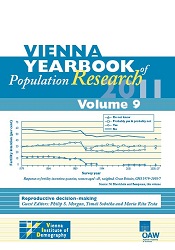
| ISBN-13 | 978-3-7001-7235-2 |
| ISBN-13 Online | 978-3-7001-7252-9 |
| Subject Area | Sociology and Economics |
| Quality review | refereed - online - print |
| doi | 10.1553/populationyearbook2011 |
Introduction

page 1
doi: 10.1553/populationyearbook2011s1
Demographic Debate

page 11
doi: 10.1553/populationyearbook2011s11

page 19
doi: 10.1553/populationyearbook2011s19

page 31
doi: 10.1553/populationyearbook2011s31

page 37
doi: 10.1553/populationyearbook2011s37

page 47
doi: 10.1553/populationyearbook2011s47

page 55
doi: 10.1553/populationyearbook2011s55

page 63
doi: 10.1553/populationyearbook2011s63

page 71
doi: 10.1553/populationyearbook2011s71
Research Articles

page 75
doi: 10.1553/populationyearbook2011s75

page 99
doi: 10.1553/populationyearbook2011s99

page 131
doi: 10.1553/populationyearbook2011s131

page 157
doi: 10.1553/populationyearbook2011s157

page 179
doi: 10.1553/populationyearbook2011s179

page 207
doi: 10.1553/populationyearbook2011s207

page 227
doi: 10.1553/populationyearbook2011s227

page 259
doi: 10.1553/populationyearbook2011s259

page 283
doi: 10.1553/populationyearbook2011s283

page 307
doi: 10.1553/populationyearbook2011s307
Data & Trends

page 327
doi: 10.1553/populationyearbook2011s327

page 335
doi: 10.1553/populationyearbook2011s335